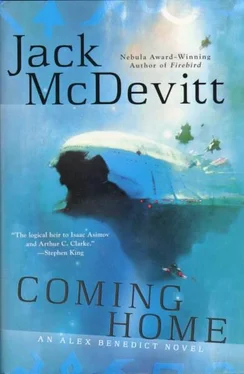Coming home
by Jack McDevitt
For Ginjer Buchanan,
longtime editor, inspiration, and friend
I’m indebted to Michael Bishop for his advice and intuition; to Walter Cuirle and David DeGraff for technical guidance; to Sara Schwager, the copy editor; to my agent, Chris Lotts; to Mike Resnick; and especially to my wife, Maureen, who always has to read the second draft.
Dates not classified as Common Era (C.E.) are based on the Rimway calendar.
11,256 C.E.
When Alex Benedict graduated high school, his uncle Gabe, the only parent he’d ever known, provided the ultimate gift: a flight to Earth, the home world, the place where everything had started. It was a mixed blessing, though. Alex had a hard time adjusting to interstellar travel, though he didn’t like to admit it. The jumps in and out of transdimensional space upset his stomach. And the constant changes in gravity levels never helped. But there was no way he would pass on the opportunity to see the oceans and mountains so prominent in his reading. And the great cities, Paris and Denver, Berlin and Shanghai. And the Alps and the Grand Canyon. The pyramids, the Great Wall, and the Arkon. And, for Gabe’s sake, he pretended to be enthusiastic about touring the world capital in Winnipeg.
What most excited him was that Gabe had promised to include a visit to the Moon. That, of course, had been the stage for everything, where Neil Armstrong had climbed out of Apollo 11, stepped down onto the ground, and delivered his giant-leap statement.
But he was surprised to discover, on their arrival, that Armstrong’s footprints were no longer there. “What happened to them?” he asked Gabe.
His uncle frowned. “Actually, nobody knows.” Gabe was tall, with black hair beginning to gray, and sharp features that had been hardened by so many years digging into archeological sites under alien suns. “They were there for a while, but they disappeared during the Dark Age. Vandals, probably.” Gabe shook his head. “Idiots.” They were seated at a small round table in an observation lounge, drinking sodas and looking across the shops and hotels and cottages that covered the lunar surface at MoonWorld, the multiplex area reserved for tourists and shielded by a semitransparent dome. A few kilometers away, the cluster of walls and beams and platforms that had been the original Moonbase lay serenely in the vacuum, illuminated by the glow of the home world, which never moved from its position just over the horizon.
Alex leaned back in his seat. “Nine thousand years,” he said. “It just doesn’t look that old.”
“Time tends to stand still in places like this, Alex. If you don’t get wind and rain, nothing changes.”
Alex picked up a change of expression, a darkening of mood. “What’s wrong, Uncle Gabriel?” he said.
“I was just thinking how much I’d have enjoyed walking around and looking at the Apollo landers. The first manned spaceships.”
“What happened to them?”
“They were here for over a thousand years. But when everything collapsed, they took all that stuff back to Earth. Too many people had access to the Moon by then, and they wanted to preserve as much as they could. So they put the landers in museums. Primarily in the Space Museum in Florida. Most of the rest of it went to the Huntsville Space Museum, where they were keeping other artifacts from the Golden Age. Eventually, though, they had to move it out of there, too, because they were losing control of the area. There’d been a worldwide economic collapse. Alabama just wasn’t safe anymore. There was a lot of material from the first thousand years of off-world exploration. Helmets, personal gear belonging to the astronauts, electronic records from the early flights. Absolutely priceless stuff.”
“So where’d they move it to?”
“Some of it was taken to Centralia. Which in those days was called the Dakotas. We don’t know how much. Or what actually was saved.” A look of weariness came into his eyes. “Whatever was left was put into a storage facility there. After that, we don’t know what happened to it.”
“It would be nice to find them,” said Alex.
“Yes, it would. Some people have devoted their lives to trying to figure out what happened. Huntsville had artifacts from the very beginning of the space era. From the Florida Space Museum. From Moonbase. From Tyuratam. I’d give anything to have been able to look through all that.”
“Florida was underwater by then, I guess?”
“Yes.”
“What happened to the Apollo flight modules?”
“They were left at the Florida Space Museum and went under with the rest of the state.”
“I bet you’d like to have one of those, Uncle Gabe.”
Gabe took on a negative look. “I’m not sure what it would sell for. It’s not exactly the kind of thing you could put on a bookshelf.”
“You’re kidding.”
Gabe smiled. “Alex, I’d give anything just to have a chance to touch one of them.” He sighed. “It’s a pity.”
“I don’t think I’d have wanted to be around during a dark age. It’s odd, though. They had interstellar flight. And data retrieval and everything.”
Gabe nodded. “None of it matters if you have an unstable society and tin-pot dictators. They had several hundred years of economic collapse. Widespread poverty. A few people at the top had all the money and influence. They had terrible overpopulation, struggles over water and resources. Civil wars. And widespread illiteracy.” The thirty-second to the thirty-ninth century. “It’s a wonder we survived.”
“But there were other worlds. Other places. How could they all have collapsed? I’ve read the books. I know what they say about greed and corruption. But I still don’t understand how people let it happen.”
“The colony worlds weren’t self-sufficient at the time, Alex. So they just got taken over. People with money and influence gradually pushed everyone else out of the way. It was like a disease.”
They sat quietly for a couple of minutes. Alex finished his soda and put the glass down. “Uncle Gabe, this would probably be a good place for a dig site. You ever think about coming here?”
“They don’t allow it, son.” He looked out at a crater rim. “I don’t think there’s much here anyway. The place has gotten a pretty thorough sweep.”
* * *
They strolled over to the museum. There were about forty people inside, wandering among the showcases, buying souvenirs, looking at portraits of astronauts and pilots and ships ranging from the Apollo vehicles to modern interstellars. They went into the showroom, which offered a virtual tour of the original Moonbase. Posters informed them the tour would show the facility as it had been on the morning of March 2, 2057, when the first manned voyage to Jupiter was nearing its objective. “Sounds like fun,” said Gabe. “Why don’t we watch?”
“Jupiter’s the big planet, right?” asked Alex.
“Yes. If it hadn’t been for Jupiter, we probably wouldn’t be here.”
“Really? Why’s that?”
“It acted as a sweeper. Cleared out a lot of the debris that would have rained down on Earth. Usually, if you don’t have one of those in the planetary system, life stays pretty primitive. If it gets moving at all.”
“The Jupiter flight was the first manned mission after Mars, right?”
“Yes. Mars was the first off-world settlement. Unless you count Moonbase, of course.”
“I know that.” Alex made no effort to hide his annoyance.
“Sorry,” said Gabe.
“You know, Uncle Gabe, I can’t imagine how they traveled around in those days without a star drive. It must have taken forever to get anywhere.”
Читать дальше












